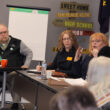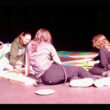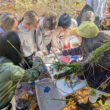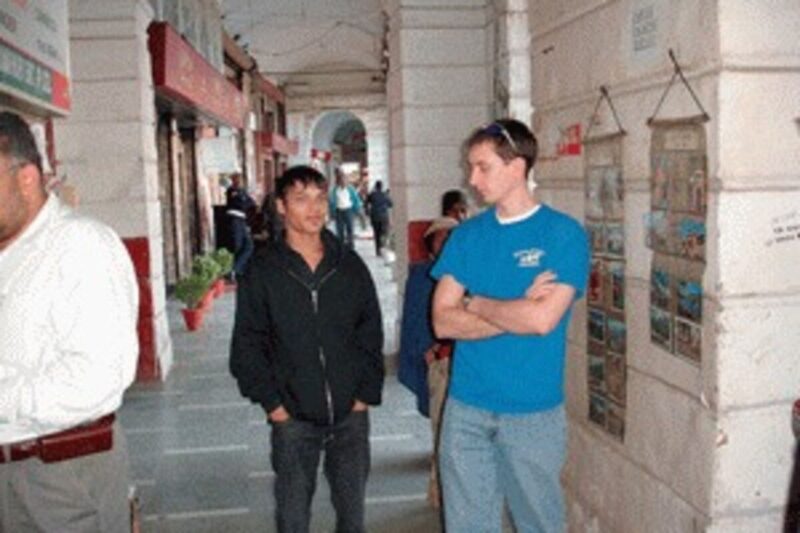Scott Swanson
Of The New Era
India is a world apart from Sweet Home, but Caleb Kropf has found it rather comfortable.
Kropf, 21, traveled to India Dec. 26-Jan. 5 with a group of five people led by Daniel Martin, a psychiatrist and pastor from Pennsylvania. They went to observe a ministry called India Partners founded by an Indian named P.C. Alexander.
For Kropf, it was more than a trip to an exotic foreign country. It was a visit to his roots. He was adopted when he was 4 months old by Leona Kropf and brought to the United States.
Caleb Kropf heard Martin speak at his mother’s church and got interested in traveling with Martin to India.
“This was the first opportunity I’ve really had to see India, to see the country where I was born,” he said. “I was comfortable there compared to the other Americans. I don’t want to say it felt like home, but I liked it.”
He said he made it a point not to have many preconceived notions before the trip.
“I didn’t expect anything,” he said. “I decided I was not going to have any expectations. I was going to be satisfied with how it is.”
What he found, though, was a bit of a surprise, he said.
The group visited New Delhi and then traveled 400 miles into the countryside to churches planted in villages by India Partners, whose goal is to plant Christian churches in India and train Indian pastors.
“Delhi was a lot wealthier than I imagined it would be,” Kropf said. “It was a lot wealthier than Calcutta, where I was born.”
He was particularly impressed with the technology, particularly the cellphones, which, he said, surpassed anything he’s seen in America.
“We have some that have some PC capabilities,” he said. “They have full-blown PC capabilities. And the coverage was everywhere. We went 400 miles outside of Delhi and there was coverage.”
And everyone, he said, has cellphones, which cost about $4 a month for full service.
“Rickshaw drivers have cellphones,” he said.
Kropf also was impressed by the public telephone system, called STDs.
“I could call Alex (Alexander) for $2 for five minutes,” he said. They had two STDs on every block, even in villages.”
Kropf said it was crowded in India, the second-largest country in the world, compared to the United States, particularly in the cities, where he said there are an average of 250 people per square mile.
“In the country, there’s lots of farmland but the population is still dense,” he said. “You’re driving along and there will be 10 fields in a row, and then you’ll come to a community of 200 people. At an intersection you have 50 people living there. A small village is 50,000 people. A large one is 200,000.
He said the caste system was not as evident as he expected.
“In general society, yeah, the beggars are there, the business people are there, and there are a lot of Western people too in Delhi,” Kropf said. “They all interact, maybe not 100 percent, but they interact more than I thought they would.
“The caste system outwardly is being done away with, but you’re still born into your caste.”
He said Hinduism, which is the religion of 80 percent of the population, is very evident in daily life.
“For a Hindu, anything can be a god,” he said. “If you’re a Hindu and you don’t have a god that’s a cow, you’ll use cows. If you do, you won’t use cows. Gods are passed down in families.”
Kropf said that six of the 27 Indian states have anti-conversion laws and some Christian pastors have been run out of town. Therefore, converts to Christianity say they’ve been “transformed” rather than “converted” and use the phrase “going under” to describe baptism.
“The culture is one that when you find something of value, they hold onto it and treasure it, like religion,” he said. “It’s something they won’t back down on.”
Kropf said the United States comes under a critical view by Indians, who look at the lifestyles and behaviors of Americans.
“We live in a Christian nation but they make fun of us,” he said. “They think we’re hypocrites.”
Kropf said that after traveling throughout the countryside, he’s learned that there’s no such thing as defensive driving in India.
“You need good brakes, a good horn and good luck,” he said. “The reason there are no bad drivers is that all bad drivers are dead. Lanes and directions are merely suggestions. The key is to never stop and to find the open hole (in traffic). If you stop, you’d better assume the person behind you is not going to stop.”
He said the only time they came close to hitting something was a black ox that was standing in the middle of the road at night.
But, he said, if someone dies in a traffic accident, the driver and passengers in the other car had better “get to the police station as soon as you can. The police are your best friends” in the face of bystanders or family members who have been known to beat or kill the offending driver, guilty or not.
Back in the states, Kropf is working as a truck driver and at the Rio Theater, but he said he liked India.
“I’d go back any day,” he said.





